Looking for compounds words for kids to understand? A compound word is formed by combining two words to create a new word. This new word will have a meaning entirely different from the word used to form it. Compound words can also sometimes be created with more than three words.
Compound word: The different types
Compound words are classified into three different types depending on the way they are formed.
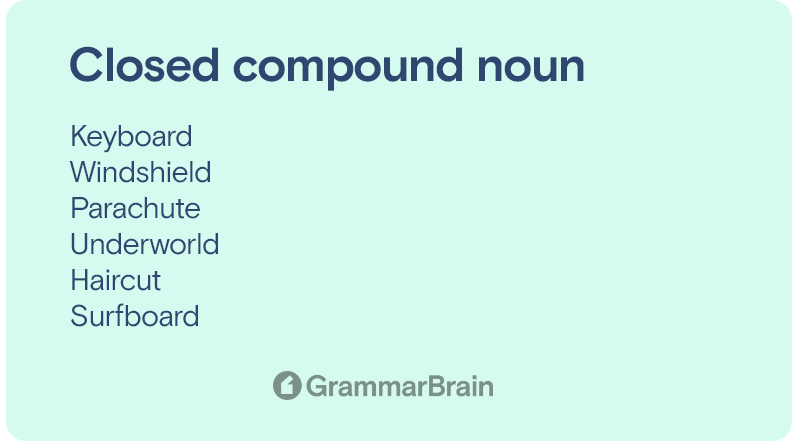
Closed compound words
A closed compound word appears like a single word. They are created by joining two words together without a space in between. They usually contain only two words and are easily recognizable. Even though these words were not always used together, they are now considered “real words.”
Examples:
- Basketball
- Snowball
- Moonlight
- Bookstore
- Waistcoat
- Notebook
- Fireman
- Armchair
- Keyhole
- Bedroom
Since English is a constantly evolving language, many words that are used extensively typically end up being written as a single word. An example of this is the word “online.” This word was spelled “on-line” during the initial stages of internet use. But now the spelling “online” has become more accepted.
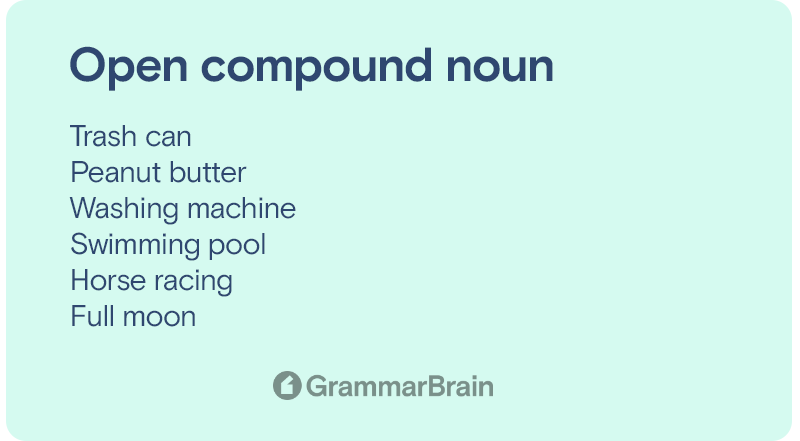
Open compound words
An open compound word is formed when a modifying adjective is combined with a noun to form an entirely new noun. They are created by joining two or more words. The words that are joined are written with a space in between. The space between the words can make it a bit difficult to identify open compound words.
Examples:
- Ice cream
- Coffee mug
- Real estate
- Living room
- Post office
- High school
- First aid
- Dinner table
- Full moon
- Hot dog
Compound words can also be formed by combining words with adverbs that end in -ly. Such compound words are also written as separate words.
Examples:
- Newly formed
- Largely irrelevant
- Highly contagious
- Newly discovered
- Freshly baked
- Lightly salted
- Poorly written
- Distantly related
Hyphenated compound words
A hyphenated compound word is created by joining two or more words and placing a hyphen between them. Compound adjectives are typically hyphenated if they come before the noun they modify rather than after. Hyphenated compound words typically serve as compound adjectives.
Examples:
- Up-to-date
- Long-term
- Day-to-day
- Snow-clad
- In-depth
- Sun-dried
- One-footed
- Hands-on
- Brother-in-law
- Well-known
Hyphenated compound words have numerous rules associated with them. This makes them a bit trickier to write and identify. In some situations, open compound words become hyphenated. Consider the word “video game.” It is an open compound word. But this word is usually hyphenated when it modifies a noun like “collector” or “player.”
Example:
Avid video game players are fervently waiting for the release of Starfield in 2023.
Hyphens are frequently employed when compound adjectives are used in front of a participle. They also modify or alter a noun. Consider the word “record-breaking show.” Here, the word “breaking” is the present participle of the verb “break.” The adjective form “record” is placed before “breaking.” Both these words serve the same purpose, describing the noun “show.”
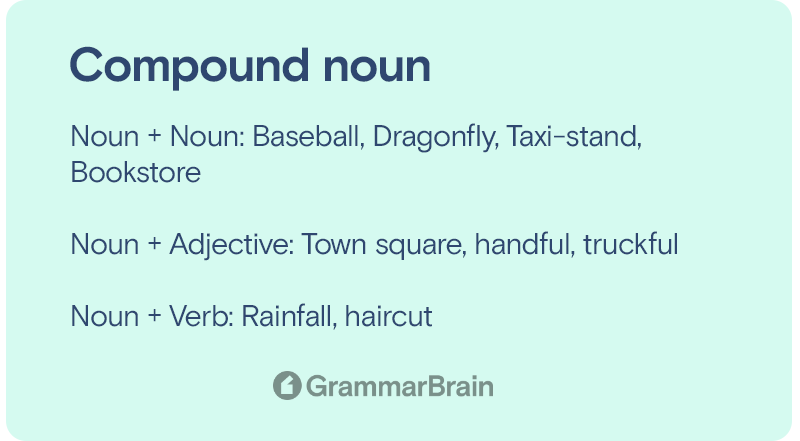
Compound nouns
Compound words that function as nouns are known as compound nouns. Examples include “boyfriend,” “firefighter,” and “greenhouse.”
Compound verbs
Compound verbs, or complex predicates, are multi-word compounds that act as single verbs. Examples include “sugarcoat,” “proofread,” and “blackmail.”
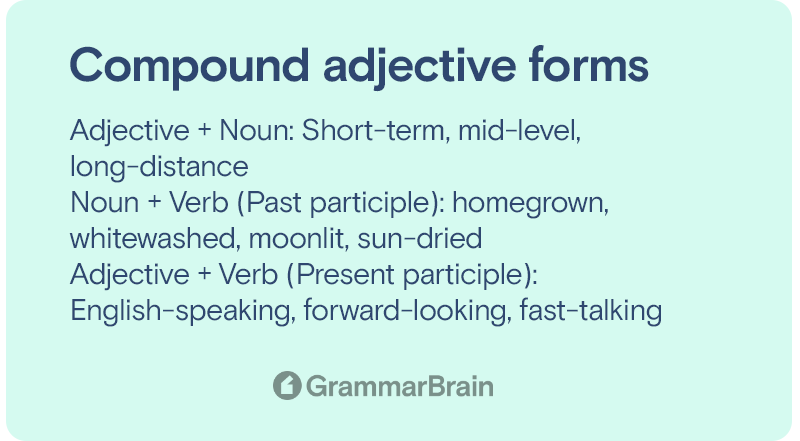
Compound adjectives
Compound adjectives are compound words that describe a noun. Examples include “short-handed,” “white-washed,” and “ice-cold.”
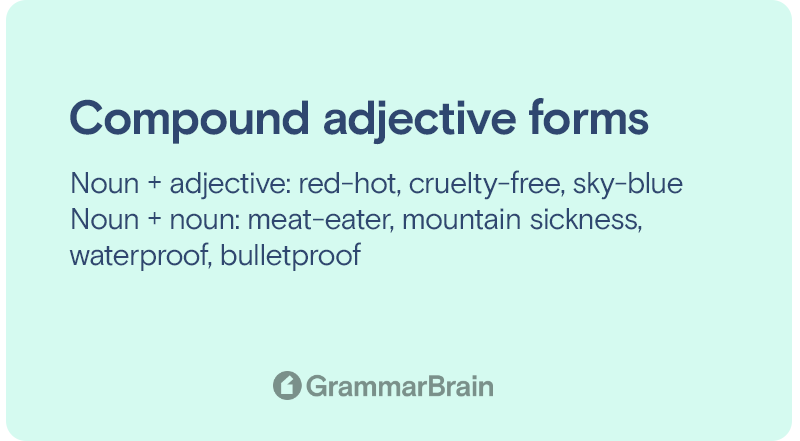
Compound word formation
Compound words are created by joining two words, particularly two components of speech. The different ways in which compound words can be formed include:
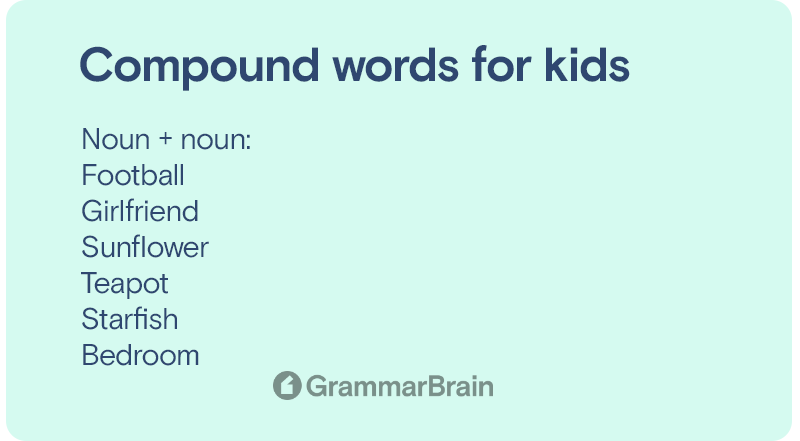
Noun + noun
Words formed by joining nouns include:
- Football
- Girlfriend
- Sunflower
- Teapot
- Starfish
- Bedroom
- Music band
- Snowman
- Cupcake
- Rainbow
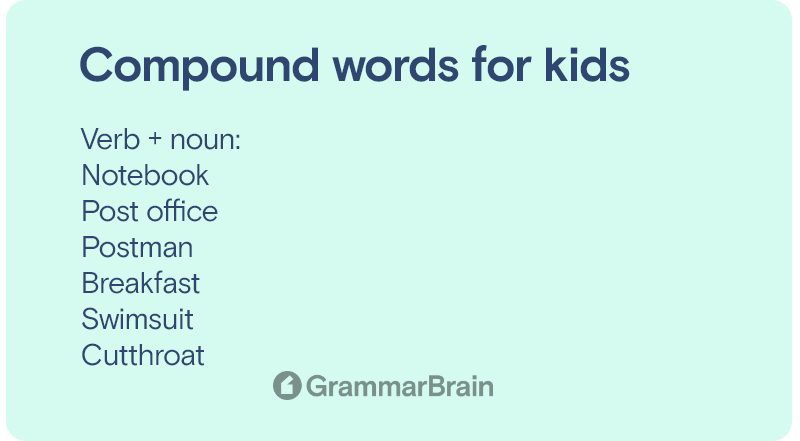
Verb + noun
Words formed by joining a verb and noun include:
- Notebook
- Post office
- Postman
- Breakfast
- Swimsuit
- Cutthroat
- Chopstick
- Typewriter
- Bathroom
- Worksheet
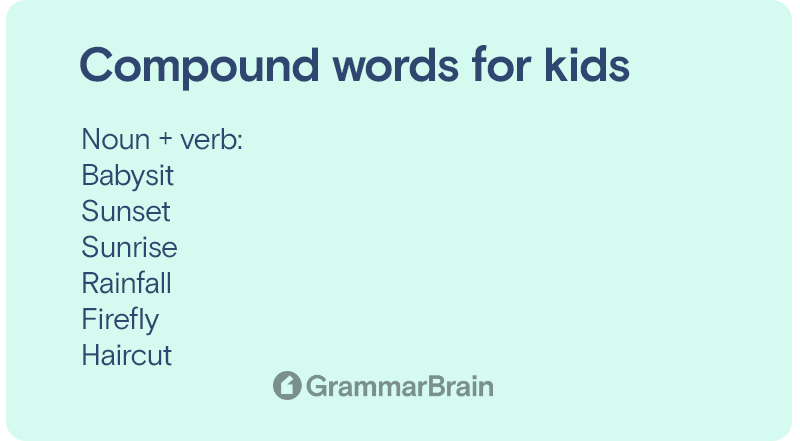
Noun + verb
Words formed by joining a noun and verb include:
- Babysit
- Sunset
- Sunrise
- Rainfall
- Firefly
- Haircut
- Raindrop
- Snowfall
- Photoshoot
- Daydream
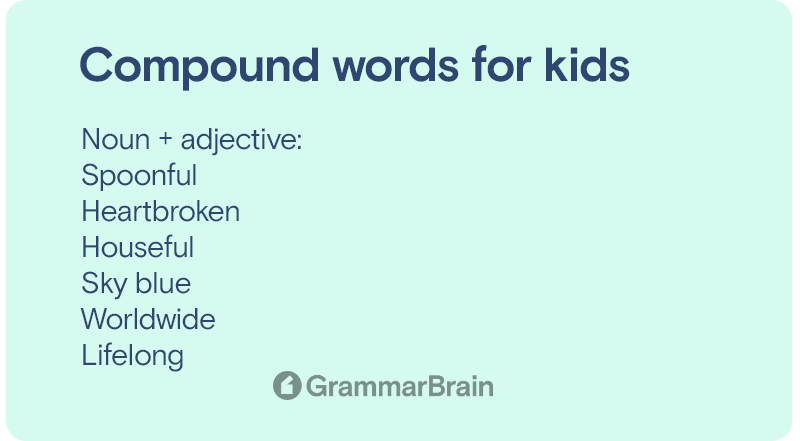
Noun + adjective
Words formed by joining a noun and adjective include:
- Spoonful
- Heartbroken
- Houseful
- Sky blue
- Worldwide
- Lifelong
- Wireless
- Snow white
- Laptop
- Sugar-free
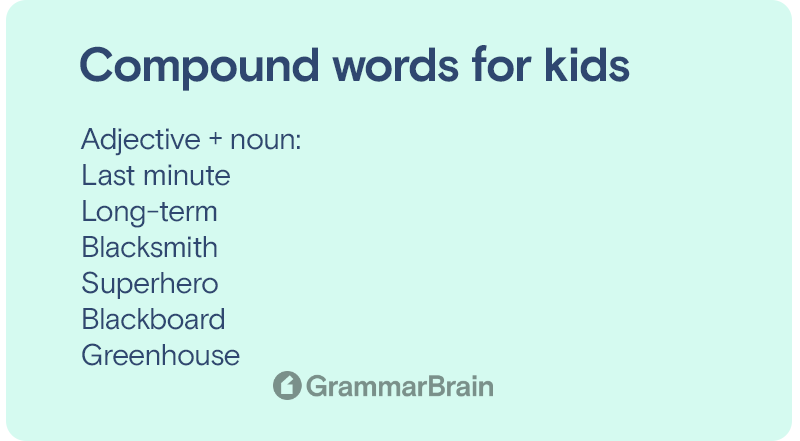
Adjective + noun
Words formed by joining an adjective and noun include:
- Last minute
- Long-term
- Blacksmith
- Superhero
- Blackboard
- Greenhouse
- Hot dog
- Full-time
- Full moon
- Bluebird
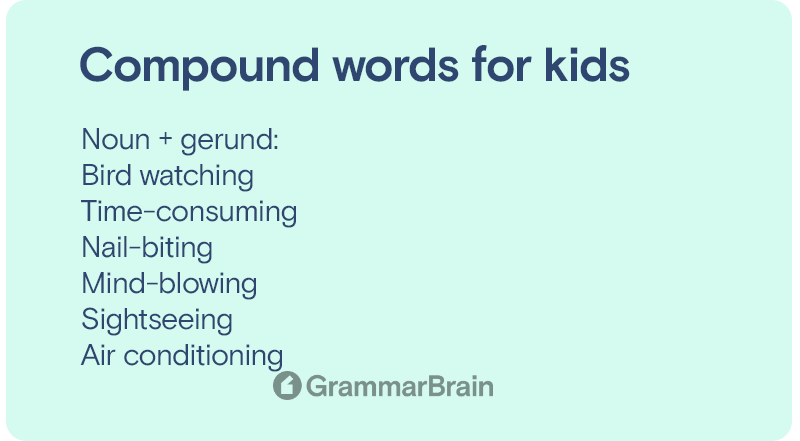
Noun + gerund
Words formed by joining a noun and gerund include:
- Bird watching
- Time-consuming
- Nail-biting
- Mind-blowing
- Sightseeing
- Air conditioning
- Brainstorming
- Nerve-wracking
- Mind mapping
- Job hopping
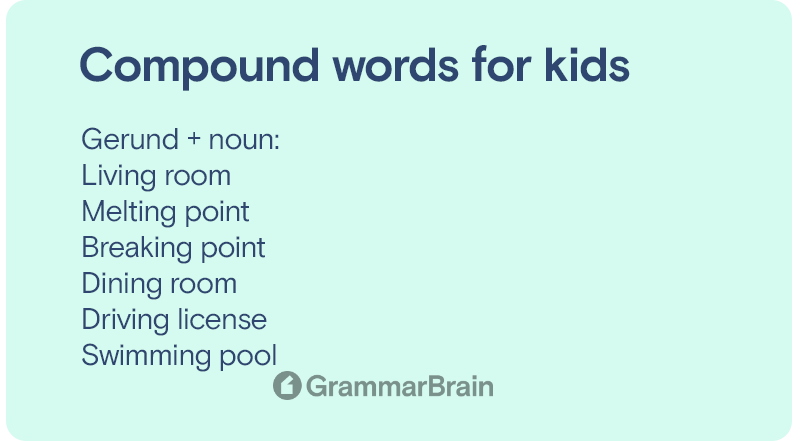
Gerund + noun
Words formed by joining a gerund and noun include:
- Living room
- Melting point
- Breaking point
- Dining room
- Driving license
- Swimming pool
- Washing machine
- Vending machine
- Managing director
- Skipping rope
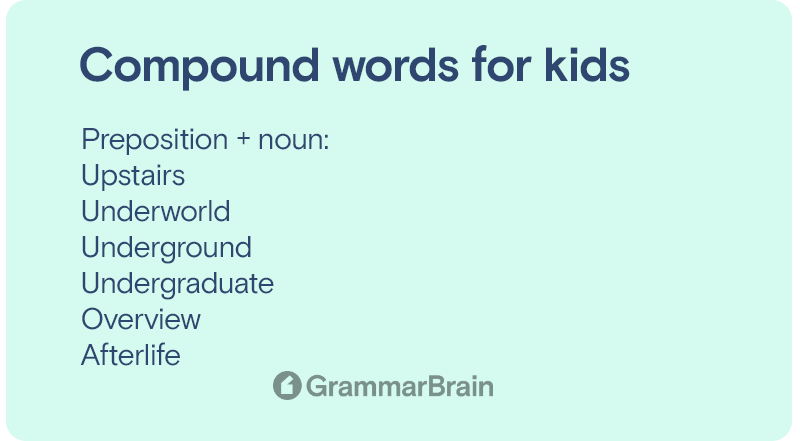
Preposition + noun
Words formed by joining a preposition and noun include:
- Upstairs
- Underworld
- Underground
- Undergraduate
- Overview
- Afterlife
- Forehead
- Bystander
- Oversight
- Background
Preposition + verb
Words formed by joining a preposition and verb include:
- Outrun
- Output
- Outdo
- Underestimate
- Understand
- Overlay
- Overthrow
- Input
- Intake
- Overreact
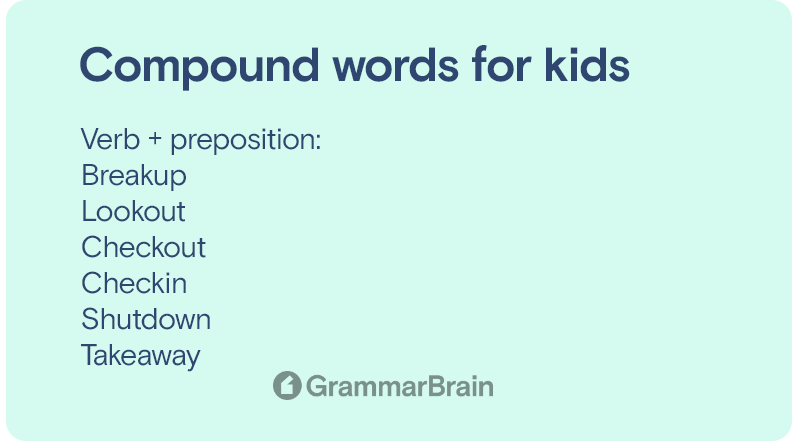
Verb + preposition
Words formed by joining a verb and preposition include:
- Breakup
- Lookout
- Checkout
- Checkin
- Shutdown
- Takeaway
- Drawback
- Takedown
- Cut through
- Roll-off
Creative techniques to teach kids compound words
Each child has a unique learning pattern and style. Every kid has a different understanding and grasping power. Learning compound words can be made interesting for kids by using some engaging and entertaining methods.
Flashcards
Kids learn easily and quickly with visual cues. Flashcards can be used to teach kids compound words as well as for end-of–lesson exercises.
Art and craft
Kids can be encouraged to make different crafts using compound words like sunglasses. The children learn the terms more easily and remember them better when they craft.
Interactive exercises
Activities like making Pictionary can help kids better remember compound words.
Exercise on compound words
Using the words given below, form open, closed, and hyphenated compound words.
- Sister
- Rain
- Sitting
- Swimming
- Minded
- Pool
- Hand
- Throat
- Half
- Bow
- Card
- Broad
- Wash
- Man
- Baby
- Made
- Top
- Counter
- Cut
- Flash
FAQs
How to identify a compound word
Though compound words are multi-syllable in nature, not all words with multiple syllables are compound words. A multi-syllable word is a compound word if it can be broken down into its component words. Consider the word “beautiful.” This word has three syllables but it cannot be divided into distinct meaningful words. So, “beautiful” is not a compound word.
But consider the word “sunshine.” Here, this word can be divided into “sunshine = sun + shine.” The individual words “sun” and “shine” have meanings.
This makes “sunshine” a compound word. So, the best strategy to determine if a given word is compound is to divide it.
What is the difference between compound and complex words
Compound words contain two or more words that are combined to produce another word with a different meaning. Examples include firefly, firefighter, and sunshine.
Complex words have one root, or base, along with one or more affixes (es). They have multiple morphemes. Examples include disestablishment and quicker.
Sources:
- Merriam Webster – compound – Definition
- Wikipedia – English compound
- Grammarly – Compound Words
- Merriam Webster – Should that word have a hyphen?
Inside this article
Fact checked:
Content is rigorously reviewed by a team of qualified and experienced fact checkers. Fact checkers review articles for factual accuracy, relevance, and timeliness. Learn more.
Core lessons
Glossary
- Abstract Noun
- Accusative Case
- Anecdote
- Antonym
- Active Sentence
- Adverb
- Adjective
- Allegory
- Alliteration
- Adjective Clause
- Adjective Phrase
- Ampersand
- Anastrophe
- Adverbial Clause
- Appositive Phrase
- Clause
- Compound Adjective
- Complex Sentence
- Compound Words
- Compound Predicate
- Common Noun
- Comparative Adjective
- Comparative and Superlative
- Compound Noun
- Compound Subject
- Compound Sentence
- Copular Verb
- Collective Noun
- Colloquialism
- Conciseness
- Consonance
- Conditional
- Concrete Noun
- Conjunction
- Conjugation
- Conditional Sentence
- Comma Splice
- Correlative Conjunction
- Coordinating Conjunction
- Coordinate Adjective
- Cumulative Adjective
- Dative Case
- Determiner
- Declarative Sentence
- Declarative Statement
- Direct Object Pronoun
- Direct Object
- Diction
- Diphthong
- Dangling Modifier
- Demonstrative Pronoun
- Demonstrative Adjective
- Direct Characterization
- Definite Article
- Doublespeak
- False Dilemma Fallacy
- Future Perfect Progressive
- Future Simple
- Future Perfect Continuous
- Future Perfect
- First Conditional
- Irregular Adjective
- Irregular Verb
- Imperative Sentence
- Indefinite Article
- Intransitive Verb
- Introductory Phrase
- Indefinite Pronoun
- Indirect Characterization
- Interrogative Sentence
- Intensive Pronoun
- Inanimate Object
- Indefinite Tense
- Infinitive Phrase
- Interjection
- Intensifier
- Infinitive
- Indicative Mood
- Participle
- Parallelism
- Prepositional Phrase
- Past Simple Tense
- Past Continuous Tense
- Past Perfect Tense
- Past Progressive Tense
- Present Simple Tense
- Present Perfect Tense
- Personal Pronoun
- Personification
- Persuasive Writing
- Parallel Structure
- Phrasal Verb
- Predicate Adjective
- Predicate Nominative
- Phonetic Language
- Plural Noun
- Punctuation
- Punctuation Marks
- Preposition
- Preposition of Place
- Parts of Speech
- Possessive Adjective
- Possessive Determiner
- Possessive Case
- Possessive Noun
- Proper Adjective
- Proper Noun
- Present Participle
- Prefix
- Predicate



